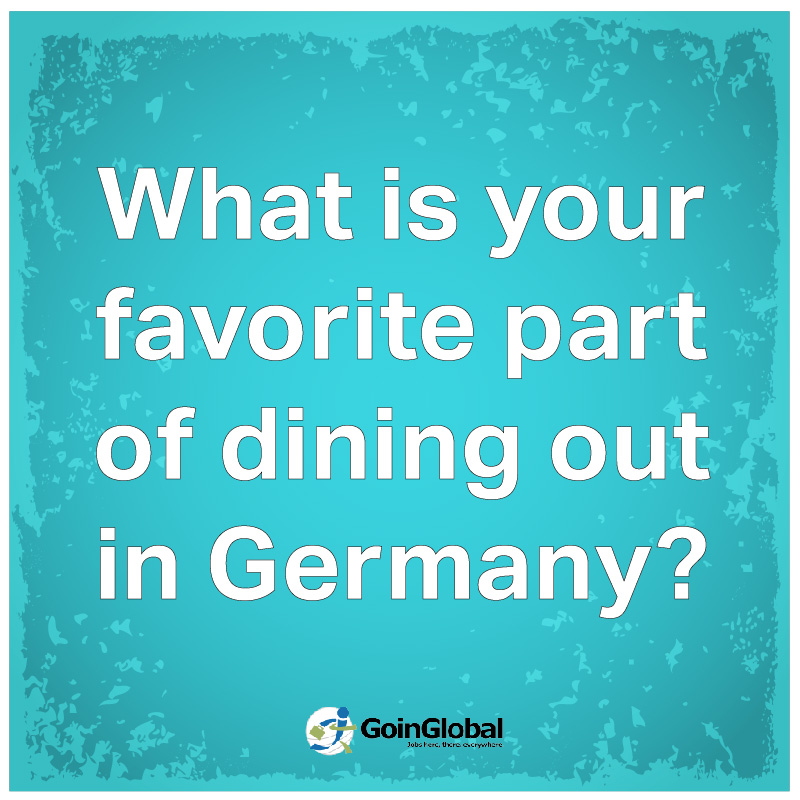What Do You Say When You Begin to Eat in Germany and You Are With a German Family

Visiting a foreign country, say, Germany, for instance, can exist challenging in any number of means. Each country is unique, with its own culture, norms, and quirks. Researching the country or countries y'all plan to visit ahead of your travels volition certainly aid y'all know what to expect when y'all get there.
One aspect of travel that you are likely to see is the dining-out experience. Agreement the placement and employ of utensils is important. Being able to speak some common phrases in the local linguistic communication for welcoming other guests or giving toasts volition proceeds y'all some respect and appreciation. If dining equally the invited guest of locals, knowing what your host or hostess expects when it comes to the cheque can help avoid a cringe-worthy faux pas. Knowing how much to tip can make you feel more confident at the cease of the dark. In that location's a lot to know to brand the dining-out experience a complete and utter success. Hither are some helpful hints for dining out like a local in Frg:
- Dining etiquette is Continental, meaning the knife is held in the right mitt and the fork in the left. Practise not switch the fork to the right hand during the meal.
- Practice not begin eating until the host says Guten Appetit (bon appétit, bask your meal).
- Common toasts are Zum Wohl! (when toasting with vino) and Prost! (with beer). Both phrases mean 'health.'
- When entering a store, information technology is customary to say Guten Tag ('hello') and Vielen Chilly, Auf Wiedersehen ('thanks, bye') when leaving.
- Tipping in restaurants is customary, although this is washed mainly by rounding up the bill.
- The person who extends the invitation volition generally pay for the meal; an attempt to 'fight' over the pecker may be taken literally by the German, and the guest volition finish up paying.
- A proposition to get something to eat together is not considered an invitation.
- Since Germans are very direct communicators, it is acceptable for guests to indicate they cannot consume sure items. This should be communicated at the earliest possible moment to avoid confusion.
- Gifts are expected for social events, especially for individual dinner parties. Appropriate gifts are fine chocolates, a sweet dessert vino or an after-dinner liqueur of proficient quality. When staying with a family, gifts from your home land for the host are appropriate; gourmet foods (maple syrup or pralines, for instance), coffee tabular array books or annihilation that reflects the host's personal tastes are always appreciated, as is a handwritten thank you card.
- Inappropriate flowers to requite every bit gifts include chrysanthemums, heather or callas (used primarily for funerals), carmine roses or orchids (also romantic). The boutonniere should include an odd number of flowers (an old European tradition).
- In North America, the phrase "How are y'all?" is meant every bit a greeting and does not crave a reply. In Germany, this question (Wie geht es Ihnen?) is taken seriously. To pose the question without awaiting a reply is considered impolite and superficial. However, in recent years this phrase has taken on a more American meaning, not to anybody's appreciation.
- Between lunch and dinner, Germans oftentimes enjoy an afternoon interruption of coffee or tea with cake, known asKaffee und Kuchen, Kaffeetrinkenor Kaffeeklatsch.
- When ordering a beer, it is best to specifyDunkles (nighttime) orHelles(light),ein Grosses orein Kleines (large or minor), vom Fass (draft) orFlasche (bottled).
Looking for a new career opportunity in Germany? See our blog Chore Opportunities in Germany.
Follow @goinglobal
Tweet to @goinglobal
Information on employment outlook for more countries can be found by logging into your GoinGlobal account!
Don't have an business relationship? Sign up for a gratis online demo to learn how yous can utilize GoinGlobal's employment resources.
Source: http://blog.goinglobal.com/dining-out-in-germany/

0 Response to "What Do You Say When You Begin to Eat in Germany and You Are With a German Family"
Post a Comment